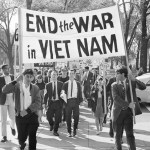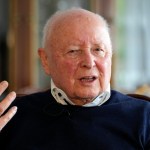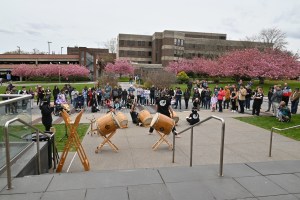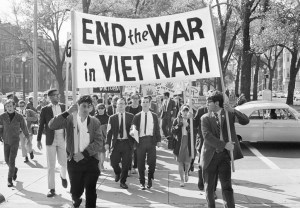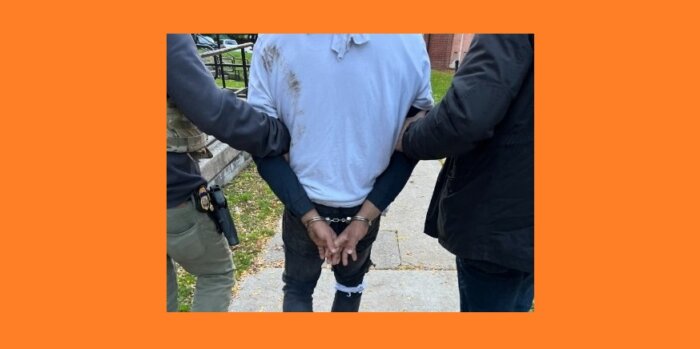
Jenn McNamara got to bed early on Sunday, but was woken soon afterward by the phone ringing, ringing. She was worried something had happened to her parents, so she made her way down the stairs of her home in Blue Point, and found on her answering machine a garbled message from a friend.
Half talking, half tears, something about Obama, Osama…it didn’t make any sense. Jenn thought maybe there had been another terrorist attack on American soil. So she turned on the TV, and found out what had happened.
“I absolutely lost it,” says Jenn. “I was hysterical crying, shaking a little. I just kept thinking, in my head, ‘John, they got him. John, they got him.’”
Jenn lost her husband, New York City firefighter John McNamara, on Aug. 9, 2009, after a long battle with cancer—cancer that came as the result of working The Pile at the World Trade Center in the days, weeks and months following the Sept. 11, 2001 terrorist attacks. Jenn is now the widowed mother of a 4-year-old boy, Jack. John was a big man with a big heart. He loved his family and his fire department. And he hated Osama bin Laden—John thought Osama bin Laden was the most evil man ever.
“There was a sense of justice,” says Jenn, of her reaction to the news. “This guy who killed so many of my friends’ husbands and sons and brothers and fathers—and contributed to the death of my husband—was dead.”
The stunning news of Osama bin Laden’s death has reverberated around the globe since tidbits first leaked from news outlets late Sunday night, propagated by trickling, then cascading accounts across social networking sites Twitter and Facebook. President Barack Obama confirmed it in a televised address to the nation from the East Room of the White House at 11:35 p.m. EDT May 1, telling the world bin Laden died at the hands of American forces in a firefight, not in a cave somewhere on the Afghanistan-Pakistan border (where he had long been suspected of hiding out), but in a heavily fortified mansion just north of Islamabad, Pakistan’s capital.
“Tonight, I can report to the American people and to the world that the United States has conducted an operation that killed Osama bin Laden, the leader of al-Qaida, and a terrorist who’s responsible for the murder of thousands of innocent men, women, and children,” he said.
“Today, at my direction, the United States launched a targeted operation against that compound in Abbottabad, Pakistan. A small team of Americans carried out the operation with extraordinary courage and capability. No Americans were harmed. They took care to avoid civilian casualties. After a firefight, they killed Osama bin Laden and took custody of his body.
“His demise should be welcomed by all who believe in peace and human dignity,” he added. “Justice has been done.”
After nearly 10 long years, in the blink of an eye, the world’s most reviled terrorist was gone.
Reactions were immediate.
World leaders expressed relief, paired with caution. News stations from around the globe began what would surely be days, if not weeks, of coverage. Social networking sites such as Twitter—which had the “highest sustained rates of Tweets ever” from 10:45 p.m. EDT Sunday to 12:30 am. Monday, averaging 3,440 tweets per second during that time—and Facebook were flooded with record traffic; people sharing their feelings, offering their perspectives or reciting those of others. Crowds converged in front of the White House, in Times Square and at Ground Zero.
Here on Long Island, home to more than 520 victims of the Sept. 11 attacks, fireworks exploded in the skies over Commack. Residents banged pots and pans in the streets outside their homes in Massapequa. On Monday evening at Nassau County’s 9/11 Memorial at Eisenhower Park in East Meadow, several dozen Long Islanders attended a candlelight vigil for victims of the terrorist attacks.
At once, a sense of unity seemed to sweep across the country, akin to the intense feeling of nationalism and solidarity birthed in the wake of the Sept. 11 atrocities. At once, Americans were again united in their collective tragedy, as their sorrow, their grief and the horrors of that crystal-clear morning nearly 10 years ago were resurrected. At once, the country was again galvanized by the insidious acts of Osama bin Laden.
For many, especially the families of the nearly 3,000 victims who were killed in the 9/11 attacks or succumbed to illnesses arising from the toxic plume that emanated from Ground Zero in the days and weeks and months following the collapse of the World Trade Center—people such as John McNamara—the news rang bittersweet; an empty victory given so much heartbreak, so much pain and so much death.
The grim, sobering fact is that since the 2003 U.S.-led invasion of Iraq, more than 100,000 Iraqi civilians have been killed. In Afghanistan, the civilian death toll tops 10,000. The two conflicts have claimed more than 6,000 American lives.
All this death for one man and his doctrine of destruction.















